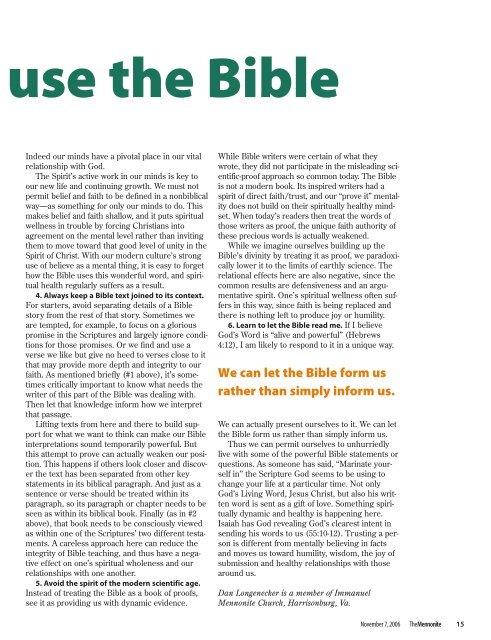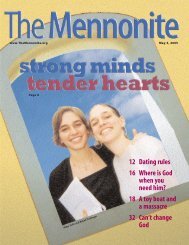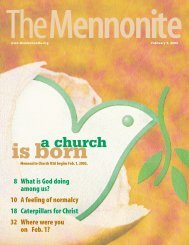11:7,6 - The Mennonite
11:7,6 - The Mennonite
11:7,6 - The Mennonite
You also want an ePaper? Increase the reach of your titles
YUMPU automatically turns print PDFs into web optimized ePapers that Google loves.
use the Bible<br />
Indeed our minds have a pivotal place in our vital<br />
relationship with God.<br />
<strong>The</strong> Spirit’s active work in our minds is key to<br />
our new life and continuing growth. We must not<br />
permit belief and faith to be defined in a nonbiblical<br />
way—as something for only our minds to do. This<br />
makes belief and faith shallow, and it puts spiritual<br />
wellness in trouble by forcing Christians into<br />
agreement on the mental level rather than inviting<br />
them to move toward that good level of unity in the<br />
Spirit of Christ. With our modern culture’s strong<br />
use of believe as a mental thing, it is easy to forget<br />
how the Bible uses this wonderful word, and spiritual<br />
health regularly suffers as a result.<br />
4. Always keep a Bible text joined to its context.<br />
For starters, avoid separating details of a Bible<br />
story from the rest of that story. Sometimes we<br />
are tempted, for example, to focus on a glorious<br />
promise in the Scriptures and largely ignore conditions<br />
for those promises. Or we find and use a<br />
verse we like but give no heed to verses close to it<br />
that may provide more depth and integrity to our<br />
faith. As mentioned briefly (#1 above), it’s sometimes<br />
critically important to know what needs the<br />
writer of this part of the Bible was dealing with.<br />
<strong>The</strong>n let that knowledge inform how we interpret<br />
that passage.<br />
Lifting texts from here and there to build support<br />
for what we want to think can make our Bible<br />
interpretations sound temporarily powerful. But<br />
this attempt to prove can actually weaken our position.<br />
This happens if others look closer and discover<br />
the text has been separated from other key<br />
statements in its biblical paragraph. And just as a<br />
sentence or verse should be treated within its<br />
paragraph, so its paragraph or chapter needs to be<br />
seen as within its biblical book. Finally (as in #2<br />
above), that book needs to be consciously viewed<br />
as within one of the Scriptures’ two different testaments.<br />
A careless approach here can reduce the<br />
integrity of Bible teaching, and thus have a negative<br />
effect on one’s spiritual wholeness and our<br />
relationships with one another.<br />
5. Avoid the spirit of the modern scientific age.<br />
Instead of treating the Bible as a book of proofs,<br />
see it as providing us with dynamic evidence.<br />
While Bible writers were certain of what they<br />
wrote, they did not participate in the misleading scientific-proof<br />
approach so common today. <strong>The</strong> Bible<br />
is not a modern book. Its inspired writers had a<br />
spirit of direct faith/trust, and our “prove it” mentality<br />
does not build on their spiritually healthy mindset.<br />
When today’s readers then treat the words of<br />
those writers as proof, the unique faith authority of<br />
these precious words is actually weakened.<br />
While we imagine ourselves building up the<br />
Bible’s divinity by treating it as proof, we paradoxically<br />
lower it to the limits of earthly science. <strong>The</strong><br />
relational effects here are also negative, since the<br />
common results are defensiveness and an argumentative<br />
spirit. One’s spiritual wellness often suffers<br />
in this way, since faith is being replaced and<br />
there is nothing left to produce joy or humility.<br />
6. Learn to let the Bible read me. If I believe<br />
God’s Word is “alive and powerful” (Hebrews<br />
4:12), I am likely to respond to it in a unique way.<br />
We can let the Bible form us<br />
rather than simply inform us.<br />
We can actually present ourselves to it. We can let<br />
the Bible form us rather than simply inform us.<br />
Thus we can permit ourselves to unhurriedly<br />
live with some of the powerful Bible statements or<br />
questions. As someone has said, “Marinate yourself<br />
in’’ the Scripture God seems to be using to<br />
change your life at a particular time. Not only<br />
God’s Living Word, Jesus Christ, but also his written<br />
word is sent as a gift of love. Something spiritually<br />
dynamic and healthy is happening here.<br />
Isaiah has God revealing God’s clearest intent in<br />
sending his words to us (55:10-12). Trusting a person<br />
is different from mentally believing in facts<br />
and moves us toward humility, wisdom, the joy of<br />
submission and healthy relationships with those<br />
around us.<br />
Dan Longenecker is a member of Immanuel<br />
<strong>Mennonite</strong> Church, Harrisonburg, Va.<br />
November 7, 2006 <strong>The</strong><strong>Mennonite</strong> 15







